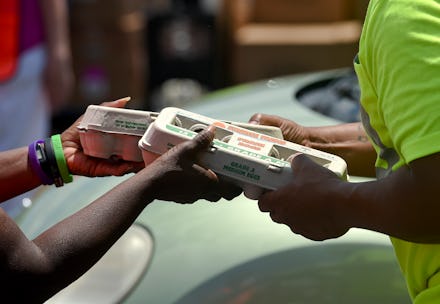The pandemic's hunger crisis is hitting Black and Latinx people the hardest

From its beginning, the coronavirus pandemic has not impacted everybody equally. In the United States, people of color are more likely to have the coronavirus, and it is killing Black people at staggering rates. But, the pandemic's impacts go beyond rapidly rising death counts. Now, a Politico report shows Black and Latinx households are hit hardest by food insecurity during the pandemic.
Before the pandemic, food insecurity in the U.S. was at its lowest point since the Great Recession, per Feeding America, a nonprofit with over 200 food banks in the U.S. But in almost no time at all, food insecurity for U.S. households doubled as the coronavirus swept through the country.
The U.S. didn't really recognize the coronavirus pandemic until March. In April, The Brookings Institute found a little more than 20 percent of households reported food insecurity. Compare that to the Department of Agriculture's 2018 data which found 11 percent of households were deemed food insecure.
But for Black and Latinx households, food insecurity is much worse. Politico reported that nearly 4 in 10 Black and Latinx households with kids are struggling with food insecurity. In addition, they are almost twice as likely to be dealing with this issue when compared to white families.
Politico's findings come from new research by economists at Northwestern University who are analyzing Census Bureau data, which is set to be published next week. Diane Whitmore Schanzenbach, director of the Institute for Policy Research at Northwestern University, told the outlet, “This is uncharted territory. We’ve never seen food insecurity rates double, or nearly triple — and the persistent race gaps are just appalling.”
Politico reported that food insecurity isn't improving even as states reopen. And given that coronavirus cases are surging — the U.S. is at nearly 3 million confirmed cases overall and just set a new daily record — it's unlikely that food insecurity is going to fix itself.
While Democrats have called for SNAP benefits to be increased by 15 percent, most Republicans aren't with the idea. But last week, Republican Rep. John Katko (NY) joined Reps. Marcia Fudge (D-Ohio) and Barbara Lee (D-Calif.) in writing a letter to both House and Senate Leadership requesting a benefit increase.
"Overwhelmed food banks and emergency food providers across the country are racing to fill the immediate need, but they cannot match the reach of SNAP," the lawmakers wrote. "We believe that Congress must take up provisions to strengthen SNAP, bolster vulnerable communities across the country, and give a hand up to millions of people facing financial hardship as a result of the pandemic."
There's never a good time to have a pandemic but it seems this one picked a particularly troublesome administration to come under. Historically, President Donald Trump hasn't been a friend to families facing food insecurity, as his administration has repeatedly gone after benefits. Hell, in March the administration planned to kick thousands of people off food stamps when its long-planned tightened work requirements went into effect.
However, the U.S. isn't the only nation where the pandemic is impacting food security. The United Nations Food and Agriculture Organization's quarterly report found that the pandemic will worsen food insecurity globally. Partially because in countries where people are already struggling to get food, the pandemic will reduce income.
This isn't the only warning about the coronavirus' global impacts coming out of the UN. In April, a report found that the coronavirus is essentially a "catastrophe within a catastrophe" for women. Overall, the coronavirus is just making a bunch of global struggles — including food insecurity, abortion access, and other health crises — worse.
Even if food insecurity starts to improve in the U.S. soon, Black and Latinx households will likely be left out of initial recovery. Not only can that already be seen with reports that, as the economy slowly begins to recover, Black workers are being left behind, but all of this has played out before.
“The disparities are long-standing, but what Covid has uncovered is that disparities can widen rapidly,” Sara Bleich, a policy professor at the Harvard T. H. Chan School of Public Health, told Politico. “And like we saw in the Great Recession, it takes much longer for lower-income, harder-hit communities to recover.”